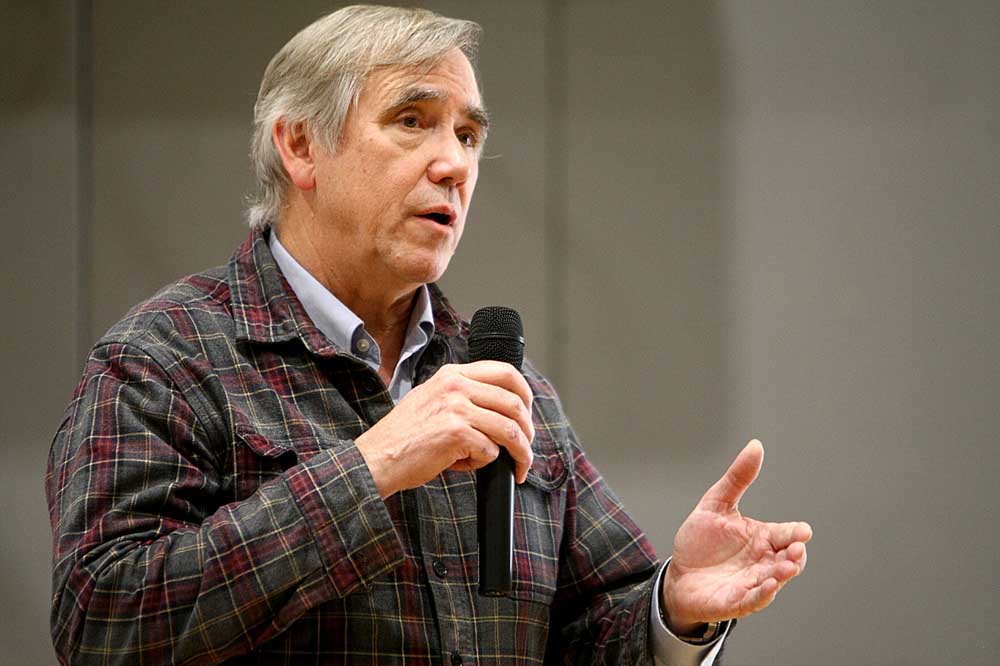Capital Chatter: Just who is in charge at the Oregon Capitol?
Published 8:00 am Thursday, May 4, 2017

- Capital Chatter: All sides waiting for Brown to lead
The governor and the Legislature are traveling parallel paths. So too are the House and Senate. But parallel lines never meet, which leaves observers wondering whether politicians ever will get together to resolve the 2017 Legislature’s big issues.
Some participants say negotiations this year are particularly difficult because they can’t tell who holds the ultimate decision-making power in the Capitol. Meanwhile, the state budget, tax reform/increases and PERS changes remain up in the air.
Trending
This week, a special House-Senate joint committee began considering an Ohio-style method of taxing businesses based on their gross annual revenues. That tax, which in Ohio requires businesses to fill out a tax form that is only one page, could replace Oregon’s corporate income tax.
• How to cut state expenses: An appointed group of five legislators recently announced a list of ways to control future state spending. Gov. Kate Brown then came out with her ideas for controlling spending.
House Speaker Tina Kotek and Senate President Peter Courtney meet with Brown weekly. But there seems to be little actual coordination between the governor and Legislature.
Maybe the answer to the legislative morass is to put Kotek, Courtney, Brown, House Republican Leader Mike McLane and Senate Republican Leader Ted Ferrioli in a room until they negotiate an agreement on all the major issues.
• Will the real business community please stand up? Public-employee unions exert tremendous power in the Oregon Capitol because the unions and their allies collaborate on joint goals. In contrast, the business community suffers because it remains splintered.
The talk at the Oregon Leadership Summit in December was that the business community, having succeeded in defeating Measure 97, was willing to consider corporate tax increases in exchange for state cost-cutting measures, especially in the Public Employees Retirement System. At the summit, Courtney and Brown urged business to take the lead, extend an olive branch to public-employee unions and negotiate in good faith.
Trending
Now, however, business folks and Republicans are balking at the Legislature’s consideration of the Ohio-style gross receipts tax for businesses.
Which leads to these questions: Was the business community never serious about negotiating with public-employee unions about taxes and cost savings, as Courtney now contends?
Did the majority Democrats call the Republicans’ bluff by working on cost-saving measures?
Or do the Democrats’ cost-saving ideas not go nearly as far as they think — and certainly not as far as Republicans want?
A fourth option: People are stalling until the next state revenue forecast comes out May 16 and then everyone miraculously will come to agreement. If only …
• A victory for free — even wacky — speech: A Marion County circuit judge has ruled that Oregonians have the right to put odd initiatives on the ballot,
Starting in 2015, a group of environmental activists sought to amend the Oregon Constitution to say that a city or county could create its own laws – and neither the state or federal governments, nor international laws and treaties, could override those local laws.
That seems clearly unconstitutional. And nutty. Don’t like government? Create your own!
The Oregon Department of Justice said the proposed amendment – known as Initiative Petition 55 — was constructed in a way that violated the state constitution. Taking that advice, the Secretary of State’s Office would not let the activists circulate the initiative for the 2016 ballot.
Circuit Judge Channing Bennett has ruled that it was up to the citizenry to decide the merits of the initiative. He said the measure met constitutional requirements for circulating an initiative petition for signatures. If voters passed the measure, then courts could consider its constitutionality.
“It is not for a few members of the executive or judicial branch to chill public discourse by preemptively determining that the substance of IP 55 would be unconstitutional if passed,” Bennett wrote. “Limiting, stopping, or directing discussion of IP 55 through Executive Action or Judicial Opinion is contrary to, and chilling, of public political speech.”
• Marijuana as good business: Many of us never expected the day would come when Interstate 5 billboards would advertise competing marijuana shops in the state’s capital. Or when marijuana growers were considered businesspeople instead of criminals.
So on Friday I dropped in at the Oregon Marijuana Business Conference in Eugene.
Except for the focus on recreational and medical use of cannabis, this could have been any business conference. Speakers stressed that cannabis businesses must operate like any good business: Follow laws and regulations to the letter. Keep excellent records. Provide great customer service. Work together for the good of the industry; don’t badmouth competitors. And give back to the community.
Panelists praised the work of the Oregon Liquor Control Commission, which regulates recreational marijuana. In contrast, medical-marijuana folks have harsh words for their regulatory agency, the Oregon Health Authority.
Henry Rollins, who was frontman of the punk rock band Black Flag, gave a rollicking keynote speech. Rollins is a staunch advocate of legalized marijuana, although he says he does not use pot.
• Grief is nonpartisan: Services were held Saturday afternoon in Grants Pass for Leta Baertschiger, the wife of Sen. Herman Baertschiger Jr. Among those attending were 27 of the 30 state senators, Secretary of State Dennis Richardson and Gov. Brown.
Dick Hughes has been covering the Oregon political scene since 1976. Contact him at TheHughesisms@Gmail.com or follow him at Facebook.com/Hughesisms.





